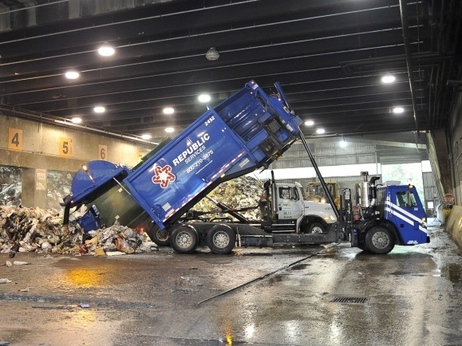In this case, through capital-intensive investment in an incinerator.
This is a sad story, because municipal investment in trash management seems both necessary and worthwhile. It seems from the description that the city borrowed a lot of money for this capital-intensive project, on the theory that user fees would service the debt. Then the EPA shut it down because it failed to meet standards. That's a big problem. So it seems they borrowed more to get it up to standards, but now there is no way for the anticipated fees to pay off the debt. So what's the solution: the city goes into receivership and they privatize the facility. Now you have an unelected official deciding whether to pay the debts or the salaries of police and firefighters (can't do both), plus a taxpayer-funded investment that will be sold at likely a deep discount to a private sector company (such as Bain Capital) that will no doubt manage to eke a profit out of it, since they need not deal with its true cost.
Even though I know that waste management is a big private business, it still seems to me that dealing with waste is a public issue, so that a city can be expected to invest taxpayer money in it. Part of the reason I think that is that a private market would tend to want more garbage (more volume, more profit), while a public system might try to minimize garbage in order to reduce costs or meet other social goals such as conservation. Admittedly this is negated by the goal in this case, which was to pay for the facility through user fees, which would follow the more volume, more profit model, at least for the term of the debt. Maybe I need to read this. In any event, the failure here seems to be connected to cash flow--if the city had more cash flow, it could carry the debt until the facility came to break even or at least come close enough to justify its cost. But the story suggests that the user fees will never be sufficient to pay off the debt. This suggests two things: first, waste management really is a public good that needs to be supported by public money, and (2) that a private buyer can only expect to make a profit by getting the facility at a discount, which means that taxpayers are subsidizing any future profits which are going in to private hands.
This is a sad story, because municipal investment in trash management seems both necessary and worthwhile. It seems from the description that the city borrowed a lot of money for this capital-intensive project, on the theory that user fees would service the debt. Then the EPA shut it down because it failed to meet standards. That's a big problem. So it seems they borrowed more to get it up to standards, but now there is no way for the anticipated fees to pay off the debt. So what's the solution: the city goes into receivership and they privatize the facility. Now you have an unelected official deciding whether to pay the debts or the salaries of police and firefighters (can't do both), plus a taxpayer-funded investment that will be sold at likely a deep discount to a private sector company (such as Bain Capital) that will no doubt manage to eke a profit out of it, since they need not deal with its true cost.
Even though I know that waste management is a big private business, it still seems to me that dealing with waste is a public issue, so that a city can be expected to invest taxpayer money in it. Part of the reason I think that is that a private market would tend to want more garbage (more volume, more profit), while a public system might try to minimize garbage in order to reduce costs or meet other social goals such as conservation. Admittedly this is negated by the goal in this case, which was to pay for the facility through user fees, which would follow the more volume, more profit model, at least for the term of the debt. Maybe I need to read this. In any event, the failure here seems to be connected to cash flow--if the city had more cash flow, it could carry the debt until the facility came to break even or at least come close enough to justify its cost. But the story suggests that the user fees will never be sufficient to pay off the debt. This suggests two things: first, waste management really is a public good that needs to be supported by public money, and (2) that a private buyer can only expect to make a profit by getting the facility at a discount, which means that taxpayers are subsidizing any future profits which are going in to private hands.

No comments:
Post a Comment